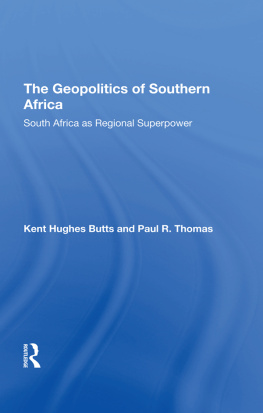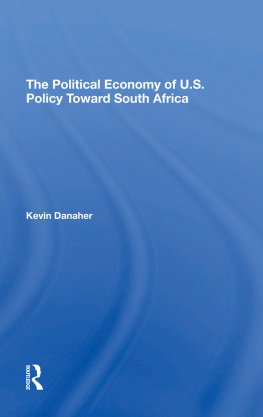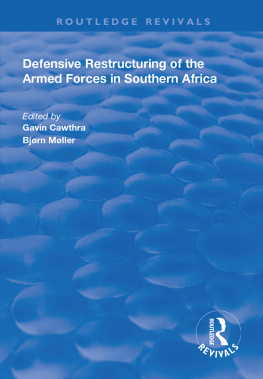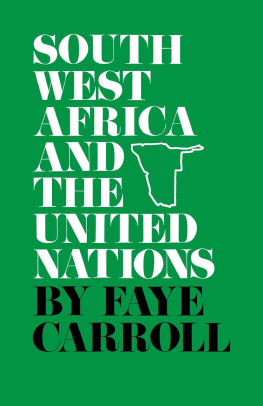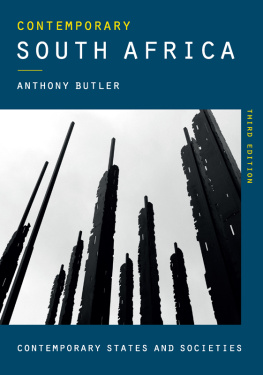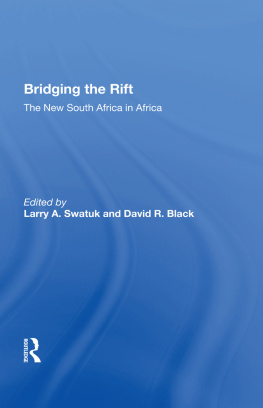About the Book and Authors
South Africa is the dominant force in an area that is of increasing strategic importance to the West, yet few studies address the geopolitical pressures that dictate the course of events there. Analyzing South Africas base of power, the authors argue that because South Africas relationships with other states in Southern Africa are asymmetrical in nature, the country has substantial economic and political leverage in the region. Control of Southern Africas transport infrastructure and the ability to project a conventional or surrogate military presence throughout the region, for example, gives South Africa the power to affect the economic and political stability of virtually all regional states. Asymmetry also characterizes relationships at the global level. Because the West depends upon South Africa for access to the regions strategic minerals, for the security of the Cape oil route, and for the countrys ability to counterbalance the Soviet presence in Southern Africa, South Africa exercises considerable influence over the African foreign policies of the superpowers.
Focusing on the major geopolitical variables affecting South Africas ability to sustain power, the authors analyze the economic and geographic factors that contribute to asymmetrical relationships and examine the pluralism that divides South African society. Pretorias successful foreign policy, which has created a security corridor of new buffer states, is given particular emphasis. In addition, the authors provide a detailed analysis of South Africas minerals-based economy and discuss the implications for regional stability of economic sanctions against South Africa. Finally, they outline a policy framework that takes regional economic, political, and geographic realities into account.
Kent H. Butts is a John M. Olin Fellow at Harvards Center for International Affairs. Paul R. Thomas is an international minerals economist
First published 1986 by Westview Press
Published 2019 by Routledge
52 Vanderbilt Avenue, New York, NY 10017
2 Park Square, Milton Park, Abingdon, Oxon OX14 4RN
Routledge is an imprint of the Taylor & Francis Group, an informa business
Copyright 1986 Taylor & Francis
All rights reserved. No part of this book may be reprinted or reproduced or utilised in any form or by any electronic, mechanical, or other means, now known or hereafter invented, including photocopying and recording, or in any information storage or retrieval system, without permission in writing from the publishers.
Notice:
Product or corporate names may be trademarks or registered trademarks, and are used only for identification and explanation without intent to infringe.
Library of Congress Cataloging-in-Publication Data
Butts, Kent Hughes.
The geopolitics of southern Africa.
(Westview special studies on Africa)
Includes index.
1. South AfricaForeign economic relationsAfrica,
Southern. 2. Africa, SouthernForeign economic
relationsSouth Africa. 3. South AfricaForeign
relationsAfrica, Southern. 4. Africa, Souther
Foreign relationsSouth Africa. 5. South Africa
Strategic aspects. 6. Africa, SouthernStrategic
aspects. I. Thomas, Paul R. II. Title. III. Series.
HF1613.4.Z4A4353 1986 337.68 8613254
ISBN 13: 978-0-367-29251-5 (hbk)
1
Geopolitical Focus on Southern Africa
South Africa is the dominant force in a region of the world that is of increasing strategic importance to the West. Yet most studies of the region concentrate on the social and cultural aspects of the South African crisis and only rarely address the geopolitical pressures that dictate the course of political events. This book takes a regional approach to the issue of South Africa and its geopolitical power in Southern Africa and in so doing brings a unique geographical perspective to the debate over what U.S. foreign policy toward the region should be. Going beyond the issue of apartheid we examine the less familiar, but critical patterns of geographic and economic forces, which to a substantial degree determine the locus of power in the region and serve as the underpinnings for South Africas regional dominance. By examining these forces we explain how South Africa established hegemony over the region, how it maintains its preeminence, and why it holds the key to the political and economic future of Southern Africa. Our objective is to define clearly the decisive role South Africa plays in the region and, within the context of economic interdependence, to understand how the United States might formulate a successful foreign policy for Southern Africa.

